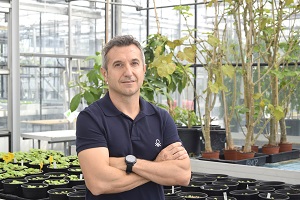Gene silencing on demand
IBMCP creates a new generation of treatments to inactivate plant genes in a selective, continuous and non-transgenic way
[ 19/10/2023 ]
A research group at the Instituto de Biología Molecular y Celular de Plantas (IBMCP), a joint research centre of the Consejo Superior de Investigaciones Científicas (CSIC) and the Universitat Politècnica de València (UPV), has developed a technology that enables plant genes to be inactivated in a precise and sustained manner with a single application of a spray. The spray contains a harmless virus that releases tiny RNA molecules designed in the laboratory to silence the desired genes. Thus, gene inactivation is achieved without modifying the plant genome, a non-transgenic method favouring market deployment. This technology could increase productivity, protect crops from viruses and improve their ability to adapt to environmental changes.
The technology developed by the team led by Alberto Carbonell, a CSIC researcher at the IBMCP, allows plant genes to be inactivated accurately and continuously thanks to tiny RNA molecules called artificial microRNAs (miRNAs). AmiRNAs are nucleic acids like DNA but much smaller, engineered to be highly specific and not inadvertently inactivate unwanted genes.
The artificial small RNAs are derived from larger precursor molecules whose size has been optimised in the model plant Arabidopsis thaliana, an herbaceous plant widely used in research in areas such as molecular biology and plant genetics. The IBMCP team applies a spray containing a harmless virus to the plant, which replicates in the organism and releases these tiny artificial RNA molecules needed to inactivate the desired gene.
"On the one hand, we have significantly reduced the size of the precursor molecules of artificial microRNAs without affecting their activity. We have also shown that we can inactivate plant genes by spraying plant extracts containing innocuous viral vectors that produce amiRNAs from minimal precursor molecules," explains Alberto Carbonell, lead author of this work recently published in Nucleic Acids Research.
Applied to the plant under study, Nicotiana benthamiana (a solanaceous plant of the tomato family, widely used as a model species in the research on plant-pathogen relationships), this technology makes it possible to inactivate plant genes a la carte using artificial microRNAs, "in a specific and non-transgenic way, since it is not necessary to integrate any gene into the plant genome," says the Research Assistant. This would facilitate their use in the European Union, where genetically modified organisms are strictly regulated. This interest has led to the filing of a European patent to protect the technology developed by the IBMCP, which is jointly owned by the CSIC and the UPV.
Increasing crop productivity and 'vaccinating' crops against viruses
Another advantage of this technology is that "a single spray is enough to infect the plant with the harmless virus and produce the amiRNAs in the infected tissues. Therefore, this method does not require multiple treatments, which would reduce application costs," summarises Carbonell. For example, the researchers inactivated the genes of the chlorophyll biosynthesis pathway in a single spray, inducing yellowing of the infected tissues.
According to the CSIC Research Assistant, a treatment based on this method applied to crops of agronomic interest "would allow the selective inactivation of the expression of their genes, which could be used to increase the productivity of crops and improve their ability to adapt to environmental changes". In addition, these treatments could be used to protect crops against various pathogens, such as viruses. "This would be a new generation of vaccines in which a plant extract would be used to infect the harvest with a harmless virus that produces artificial microRNAs specific to a pathogenic virus for inactivation, thus immunising the crop.
Outstanding news
 ARWU 2023
ARWU 2023
The Shanghai ranking reaffirms the UPV as the best polytechnic in Spain for yet another year
 Science Meets Regions CV 2023
Science Meets Regions CV 2023
The UPV and the Almussafes City Council begin a collaboration in search of solutions to maintain the automobile sector in the Valencia Region
 Scientific reference
Scientific reference
Avelino Corma, Distinguished Research Assistant at the UPV, awarded an Honorary Doctorate by the University of Huelva
 Micronanofabs NTC UPV-PERTE CHIP Conference
Micronanofabs NTC UPV-PERTE CHIP Conference
María Marced, TSMC Europe president: "The sector's future is bright, the market is expected to double by 2030"
 Goya nomination
Goya nomination
Javier Polo, who holds a degree in Audiovisual Communication from the UPV, directs the successful short documentary Una terapia de mierda
 Sant Carles Medal 2023
Sant Carles Medal 2023
The Faculty of Fine Arts of the UPV awards the Sant Carles Medal 2023 to outstanding Valencian art and culture figures





